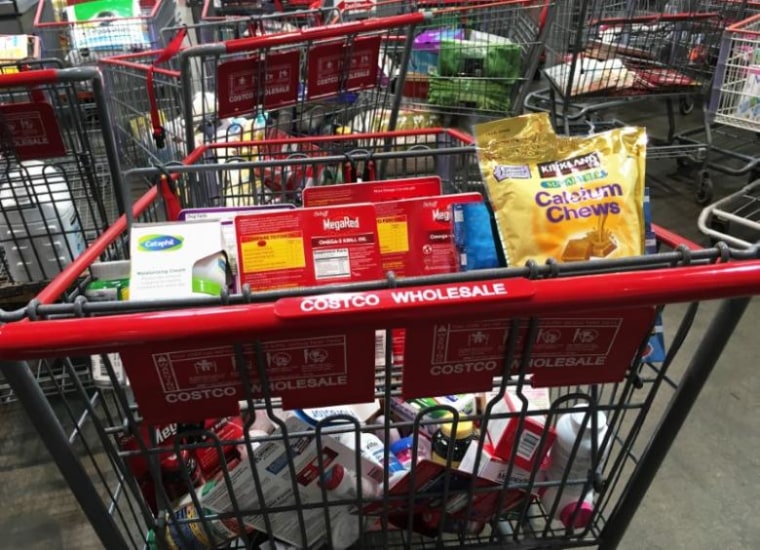Analysts predict big changes — and new risks — for grocers following Amazon’s surprise purchase of Whole Foods, but they also say there is a clear winner here: Shoppers.
“This was a very exciting announcement because I think consumers will be the ones to benefit,” said Lindsay Sakraida, director of content marketing at DealNews, predicting that competitors will improve pricing, loyalty promotions and other inducements across a wide range of categories to try and keep customers from defecting to Amazon for pantry staples, dry goods, and even fresh food.
“I do see it as covering a broad variety of categories,” Sakraida told NBC News. “If they bring ordering groceries online in a very efficient way, you’ll have a very powerful tool to know if you’re getting the best price.”
Good news for consumers means worry for brick-and-mortar grocers, though. “I think it certainly comes as a surprise for Walmart in some respects,” said Ryne Misso, director of marketing at Market Track, adding that the acquisition also puts other grocery chains like Kroger on notice. “They’ll have to reassess everything. I think they’re going to have to ask some tough questions,” he said.
People Trust Whole Foods
A major stumbling block for companies trying to turn grocery shopping into an e-commerce experience is that, unlike books, clothes or electronics, fresh food items aren’t identical. Shoppers still want to pick out which steak or tomatoes go into their carts. This is where Whole Foods — even with its “whole paycheck” reputation — could come in handy.
“What Whole Foods brings to the table is the credibility with consumers — the trust factor,” said David Portalatin, vice president of industry analysis for food at the NPD Group, a market research firm.
“Whole Foods has an element of brand trust,” Misso said, which could assuage shoppers’ hesitation about ordering fruit or fish sight unseen. “You immediately set the bar higher.”
Some suggest Amazon’s scope and scale could even help drive prices down without compromising quality and risking the value of Whole Foods’ reputation. “One of Amazon’s fundamental principles is to use technology as a method for becoming much more efficient and delivering lower prices to consumers,” said Larry Light, CEO of marketing consulting company Arcature.
No one expects these changes to come overnight — the purchase itself isn’t expected to be finalized until later this year — but some suggested that Amazon eventually could do for groceries what it did for everything from paperbacks to paper plates.
Related: How Amazon Changed the Way We Shop
“Books were also a very competitive low margin business,” Light pointed out. “They were in the book business and lost money for 10 years and didn’t give up.”
Brendan Witcher, principal analyst of digital business strategy at Forrester Research, called Whole Foods the “crown jewel” of an evolving retail strategy that incorporates other emerging and experimental shopping methods including Amazon Fresh delivery, checkout-free Amazon Go and voice-powered ordering through virtual assistant Alexa.
“You really can’t do grocery efficiently without the physical stores,” Witcher said.
What Will Happen to Whole Foods Stores?
Whole Foods’ 400-plus stores could one day be more than mere grocery stores, serving as distribution hubs for a broader inventory of Amazon products.
“They are buying actual storefronts, but to me, the thing that struck me about the move was the use of Whole Foods almost as warehouses,” Sakraida said. “Amazon is really trying to build out Prime Now [so] they had to start acquiring space,” she said. “It seems like they just bought the network. They don’t have to worry about scaling.”
Portalatin said Whole Foods’ store network could go a long way bridging the so-called “last mile” gap between Amazon fulfillment centers and people’s homes.
One reason analysts have been eager to see Walmart expand its e-commerce initiatives is that the company has a vast network of storefronts that could easily be multipurposed to serve as distribution facilities. By taking Whole Foods under its umbrella, Amazon just bought a footprint that covers all major U.S. markets, with a concentration in young, wealthy neighborhoods.
Related: Whole Foods Was Overcharging for Its Packaged Foods
Since the deal also gives Amazon another way into shoppers’ weekly shopping habits, success in the grocery arena would function as a de facto advertisement for its lucrative Prime subscription service. Portalatin pointed out that although just 7 percent of people bought groceries online in the last month, a little over half of those are Amazon Prime members. “It certainly could enhance the penetration or total share of wallet Prime members are spending at Amazon,” he said.
“Prime is the absolute flagship of Amazon, and they’ve cracked subscription in a way no one else has. The big picture gets bigger as far as they’re concerned,” said Hugh Tallents, a partner at management consultancy cg42.
Grocery Stores Are on Notice
While shares of rival grocery chains like Kroger and Costco fell in the wake of Amazon’s announcement, Witcher said all retailers should consider Amazon’s move as a shot across the bow.
"This is really a red flag for all retailers, not just grocery,” Witcher said. “The grocery play… is an evolution for Amazon. We’re just in the first inning,” he said. “Once Amazon wins the weekly shopper, they can sell everything to them,” he said.
In a way, Amazon is reversing the strategy that made big-box retailers like Walmart and Target players in the supermarket business. Shoppers already went there for other goods, so adding groceries cemented their value as a one-stop shopping. By combining that with the convenience of click-to-buy and delivery, Amazon is building out the next step, Witcher said. “It’s an all-out retail play.”
